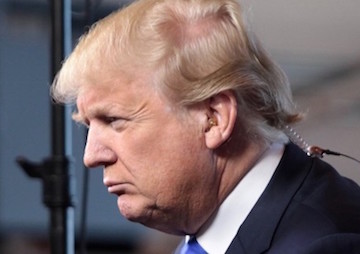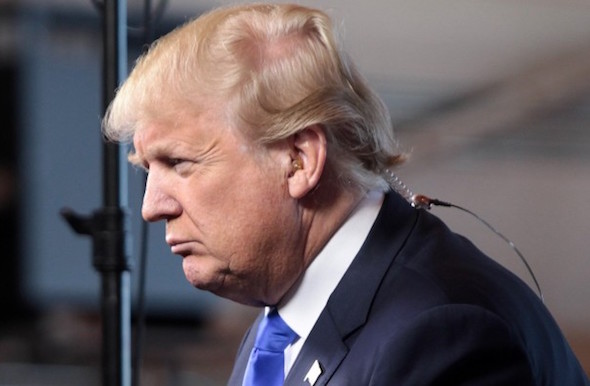Climate Confusion Creeps Into the Trump Camp
Despite the Republican presidential candidate’s claim that climate change is a hoax, a new survey has found that more than half of his supporters believe global warming is happening.
By Alex Kirby / Climate News Network

Many supporters of Donald Trump appear to disagree with his scepticism about climate change. (Gage Skidmore via Flickr)
This piece first appeared at Climate News Network.
LONDON — Perhaps you think nothing else could surprise you in the run-up to this year’s US presidential election, with Donald Trump apparently certain to be the Republican candidate. You could be wrong.
Trump has described global warming as “a total, and very expensive, hoax”, and told The Washington Post he is “not a great believer in man-made climate change”.
But a national survey of US voters has found that more than half of Trump supporters (56%) think global warming is happening — although almost all of them (55%) blame natural causes. And almost half of them (49%) think the US should reduce its greenhouse gas emissions, regardless of what other countries do.
The survey findings are published in a report produced by the Yale Programme on Climate Change Communication. They are based on a nationally representative survey of 1,004 American adults, aged 18 and older, who are registered to vote.
Presumptive nominee
It showed that, with the exception of Ted Cruz voters, most supporters of all the Democratic and Republican candidates think global warming is happening.
Only 38% of Cruz supporters think global warming is a reality. But now that Cruz has dropped out of the race — leaving Trump as the presumptive nominee — it will be interesting, the report’s authors write, “to see if Cruz backers decide to support Trump or sit this election out”.
The survey also found that registered voters support a broad array of energy policies, including many designed to reduce carbon pollution and dependence on fossil fuels. Democrats are most enthusiastic, but many Republicans are also keen.
When it comes to funding more research into renewable energy, for example, 76% of Trump’s backers are in favour, and 70% of them think people who buy energy-efficient vehicles or solar panels should receive tax rebates.
At least half the supporters of all candidates except Cruz would also support regulating carbon dioxide as a pollutant.
And more than half of all respondents — again, except Cruz supporters — favour requiring fossil fuel companies to pay a carbon tax, and then using the money to reduce income and other taxes by an equal amount. The Trump camp squeaks in here by 51%.
“Some reassurances about the stability of the economy . . . might help everyone get on the same page about climate change so we can seek some solutions.”
The report says supporters of Democratic front-runner Hillary Clinton are more likely to be African-American, women, Catholics, and baby boomers than the other candidates’ supporters. Trump supporters are likelier to be white, male, baby boomers with a high school education. Cruz supporters are more typically southern, older, white, evangelical, men, and very conservative.
While fewer than half of any candidate’s supporters realise that virtually all climate scientists agree that human-caused global warming is happening, only 3% of Trump backers understand the scientific consensus. Despite this, 35% of them say they are very or quite worried about global warming.
Politics aside, some social scientists say Americans may be likelier to accept the scientific evidence if they believe the economy is strong.
Research published online in the Journal of Experimental Psychology: General by the American Psychological Association suggests that people who are concerned about the economy and who are strong supporters of the free market may be more sceptical about climate change.
Scientific consensus
“The problem isn’t primarily ignorance,” says the lead researcher, Erin Hennes, an assistant professor of psychological sciences at Purdue University. She and her colleagues noticed that acceptance of the scientific consensus fell by 11% in the US during the recession from 2007 to 2009.
In an online experiment, they found that of 187 Americans who watched a newscast with sceptical commentary about a NASA documentary on climate change, those who more enthusiastically supported the capitalist system were more dubious about climate change and failed to remember facts from the newscast about its severity.
But those who were more critical of capitalism and more interested in social change recalled the information about climate change as being even more severe than the facts they had seen. Two other experiments produced broadly similar results.
Acknowledging the small sample sizes in all three experiments, Dr Hennes says: “Some reassurances about the stability of the economy may help people take information about human-caused climate change more seriously. It might help everyone get on the same page about climate change so we can seek some solutions.”
Alex Kirby is a former BBC journalist and environment correspondent. He now works with universities, charities and international agencies to improve their media skills, and with journalists in the developing world keen to specialise in environmental reporting.
Your support matters…Independent journalism is under threat and overshadowed by heavily funded mainstream media.
You can help level the playing field. Become a member.
Your tax-deductible contribution keeps us digging beneath the headlines to give you thought-provoking, investigative reporting and analysis that unearths what's really happening- without compromise.
Give today to support our courageous, independent journalists.






You need to be a supporter to comment.
There are currently no responses to this article.
Be the first to respond.